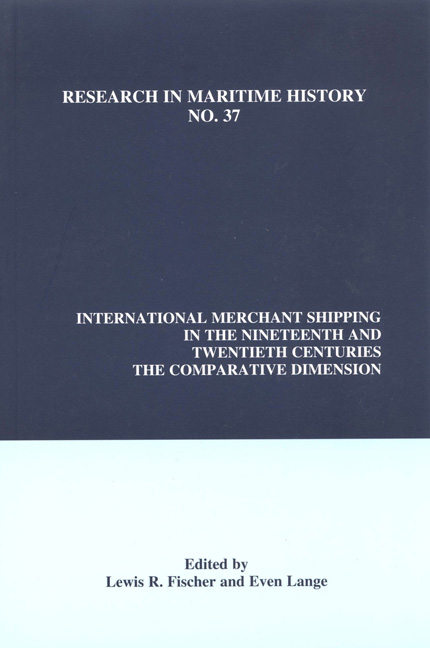Book contents
- Frontmatter
- Contents
- Contributors' Notes
- Contributors
- Introduction
- “Growth, Diversification and Globalization: Main Trends in International Shipping since 1850”
- “Norwegian Shipping in the Twentieth Century”
- “The Greek Shipping Sector, c. 1850-2000”
- “A Guide to the Emergence of Japan's Modern Shipping Industries”
- “British Shipping from the Late Nineteenth Century to the Present”
- “North of England Shipowners and Their Business Connections in the Nineteenth Century”
- “Network Structures, Processes and Dynamics: Inter-firm Cooperative Frameworks in the Shipping Industry”
“Norwegian Shipping in the Twentieth Century”
- Frontmatter
- Contents
- Contributors' Notes
- Contributors
- Introduction
- “Growth, Diversification and Globalization: Main Trends in International Shipping since 1850”
- “Norwegian Shipping in the Twentieth Century”
- “The Greek Shipping Sector, c. 1850-2000”
- “A Guide to the Emergence of Japan's Modern Shipping Industries”
- “British Shipping from the Late Nineteenth Century to the Present”
- “North of England Shipowners and Their Business Connections in the Nineteenth Century”
- “Network Structures, Processes and Dynamics: Inter-firm Cooperative Frameworks in the Shipping Industry”
Summary
Norway is the greatest ship-owning country, relative to size, in the world. The explanation is not far to seek. The meagre resources of the land are insufficient to support the population. The natives are compelled to turn to the sea for their livelihood…In spite of the fact that shipping is one of the poorest paying businesses of the world, Norwegian capital and labor perforce must go to sea…By reason of its surplus of cheap, efficient labor and its serviceable fleet, Norway is prepared to do the cheap freighting of the world better and cheaper than any rival.
From ancient times the Scandinavian peoples have been, in a prominent degree, engaged in shipping. In that way they introduced themselves for the first time in the history of Western Europe, in a rather violent manner by the Viking expeditions; while the Norwegians, or Norwegian colonists, discovered Iceland, Greenland, and even the North American continent nearly five centuries before the discoveries of Columbus. And in our day the Scandinavian flags, covering a seafaring trade far beyond what might be expected from the small population of these countries, wave in every part of the world.
More than 100 years after the renowned shipping statistician A.N. Kiaer wrote the above paragraph in the Journal of Political Economy, Scandinavian - and, in particular, Norwegian - shipping continues to play an important role internationally. Is the substantial Norwegian involvement in shipping an indication of the Norwegians’ ability to stand their ground in one of the most competitive sectors in the world, or is it - as H.C. Calvin and E.G. Stuart argued - a result of limited shore-based alternatives? While the latter element has limited explanatory power in today's liberalized global economy, except through tradition and path-dependence, it was undoubtedly important for pre-petroleum Norway when domestic markets were more detached. Nonetheless, shipping still plays a significant role in Norway's economic fabric.
The aim of this article is to sketch some of the main trends in Norwegian shipping in order to illuminate the industry's contribution to the economy and to evaluate the country's position in international shipping. The focus is on long-term development.
- Type
- Chapter
- Information
- International Merchant Shipping in the Nineteenth and Twentieth CenturiesThe Comparative Dimension, pp. 57 - 78Publisher: Liverpool University PressPrint publication year: 2008



